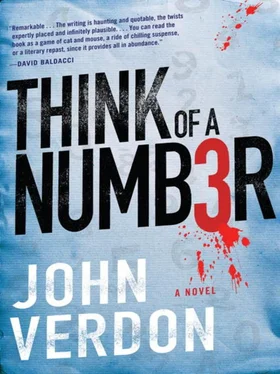He called Randy Clamm, thanked him for the update, and gave him a number at the DA’s office to fax Rudden’s letters, plus a number at BCI so a set could go to Rodriguez. Then he filled him in on the Richard Kartch situation, including the flounder connection and the fact that an alcohol element was now obvious in all three cases.
As for Sonya’s call, that could wait. He was in no great rush to call Hardwick, either. His mind kept jumping to the following day’s meeting at BCI. Not jumping there with joy-far from it. He hated meetings in general. His mind worked best alone. Groupthink made him want to leave the room. And his hasty poetic grenade tossing was making him uncomfortable about this meeting in particular. He didn’t like having secrets.
He sank down in the soft leather armchair in the corner of the den to organize the key facts of the three cases, figure out what overall hypothesis they best supported, and how to test it. But his sleep-deprived brain would not cooperate. He closed his eyes, and all semblance of linear thought dissolved. How long he sat there he wasn’t sure, but when he opened his eyes, heavily falling snow had begun whitening the landscape, and in the singular stillness he could hear a car far down the road, coming closer. He pushed himself up out of the chair and went to the kitchen, arriving at the window in time to see Madeleine’s car disappearing behind the barn at the end of the public road, presumably to check their mailbox. A minute later the phone rang. He picked up the extension on the kitchen counter.
“Good-you’re there. Do you know if the mailman has been here yet?”
“Madeleine?”
“I’m down by the box. I have something to mail, but if he’s been here already, I’ll drop it off in town.”
“Actually, it was Rhonda, and she was here a while ago.”
“Damn. All right, no matter, I’ll deal with it later.”
Slowly her car emerged from behind the barn and turned up the pasture road to the house.
She entered through the side door of the kitchen with the strained look that driving in snow put on her face. Then she noted the very different look on his face.
“What’s up?”
Engrossed in a thought that had occurred to him during her call from the mailbox, it wasn’t until she’d taken off her coat and shoes that he answered.
“I think I just figured something out.”
“Good!” She smiled and awaited the details, shaking snowflakes out of her hair.
“The number mystery-the second one. I know how he did it-or how he could have done it.”
“The second one was?”
“The one with the number nineteen, the one Mellery recorded. I showed you the letter.”
“I remember.”
“The killer asked Mellery to think of a number and then to whisper it to him.”
“Why did he ask him to whisper? By the way, that clock is wrong,” she said, looking up at the Regulator.
He stared at her.
“Sorry,” she said lightly. “Go on.”
“I think he asked him to whisper because it added an odd element to the request that would lead him further from the truth than a simple ‘Tell me the number.’”
“I don’t follow you.”
“The killer had no idea what number Mellery had in mind. The only way to find out was to ask him. He was just trying to blow some smoke around that issue.”
“But wasn’t the number mentioned in a letter the killer had already left in Mellery’s mailbox?”
“Yes and no. Yes, the number was mentioned in the letter Mellery found in the box a few minutes later, but no, it wasn’t already in the box. In fact, the letter hadn’t been printed yet.”
“You lost me.”
“Suppose the killer had one of those mini printers attached to his laptop, with the text of the letter to Mellery complete except for the right number. And suppose the killer was sitting in his car by Mellery’s mailbox on that dark country road that runs past the institute. He calls Mellery on his cell phone-like you just called me from our mailbox-persuades him to think of a number and then ‘whisper’ it, and the instant Mellery says the number, the killer enters it in the letter text and hits the print button. Half a minute later, he sticks the letter in an envelope, pops it in the mailbox, and drives off-creating the impression that he’s a diabolical mind reader.”
“Very clever,” said Madeleine.
“Him or me?”
“Obviously both of you.”
“I think it makes sense. And it makes sense that he recorded traffic noise-to give the impression that he was somewhere other than a quiet country road.”
“Traffic noise?”
“Recorded traffic noise. Smart lab tech at BCI ran a sound-analysis program on the tape Mellery made of the phone call and discovered that there were two background sounds behind the killer’s voice-a car engine and traffic. The engine was first generation-that is, the sound was actually occurring at the same time as the sound of the voice-but the traffic was second generation, meaning that a tape of traffic sounds was being played behind the live voice. Didn’t make sense at first.”
“Now it does,” said Madeleine, “now that you’ve figured it out. Very good.”
He looked closely at her, searching for the sarcasm that so often underlay her comments on his involvement in the case but finding none. She was regarding him with real admiration.
“I mean it,” she said, as if detecting his doubt. “I’m impressed.”
A recollection came to him with surprising poignancy: how frequently she’d once looked at him that way in the early years of their marriage, how wonderful it had been to receive so often in so many ways the loving approval of such a fiercely intelligent woman, how priceless was the bond between them. And there it was again, or at least a delightful hint of it, alive in her eyes . And then she turned a little sideways toward the window, and the gray light dimmed her expression. She cleared her throat.
“By the way, did we ever get a new roof rake? They’re talking about ten to twelve inches of snow before midnight, and I’m not looking forward to another leak in the upstairs closet.”
“Ten to twelve inches?”
He seemed to remember there was an old roof rake in the barn, maybe repairable with enough duct tape…
She uttered a small sigh and headed for the stairs. “I’ll just empty the closet.”
He couldn’t think of anything sensible to say. The phone ringing on the countertop saved him from saying something stupid. He picked it up on the third ring. “Gurney.”
“Detective Gurney, this is Gregory Dermott.” The voice was polite but fraught.
“Yes, Mr. Dermott?”
“Something happened. I want to make sure I’m alerting the proper authorities.”
“Happened?”
“I received a peculiar communication. I think it may be connected to the letters you told me were received by the crime victims. Can I read it to you?”
“First tell me how you got it.”
“How I got it is more disturbing than what it says. God, it makes my skin crawl! It was taped to the outside of my window-my kitchen window next to the little table where I have my breakfast every morning. Do you see what that means?”
“What?”
“It means he was there, right there touching the house, no more than fifty feet from where I was sleeping. And he knew what window to tape it to. That’s what makes it so creepy.”
“What do you mean, what window to tape it to?”
“The window where I sit every morning. That’s no accident-he must know that I have breakfast at that table, which means he’s been watching me.”
“Have you called the police?”
“That’s why I’m calling you now.”
“I mean your local police.”
Читать дальше












